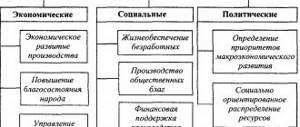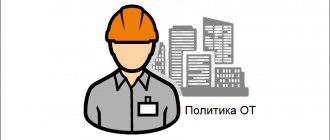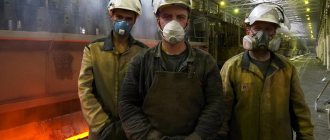Responsibilities of the employer to ensure labor safety
Occupational safety (OS) is aimed at preserving the life and health of employees. At an enterprise, responsibilities for ensuring occupational safety lie entirely with the employer.
In accordance with the Labor Code of the Russian Federation, the employer is obliged to provide:
- safety of workers during the operation of buildings, equipment, tools, raw materials and supplies;
- creation and operation of an occupational safety management system;
- use of individual and collective protective equipment;
- work and rest schedule for employees in accordance with laws and regulations, etc.
If the manager fails to fulfill his responsibilities to ensure a safe working environment for his subordinates, he may be held legally liable. For example, an employer must bear financial liability if harm is caused to the life and health of employees as a result of an industrial accident.
The employer's responsibilities also include providing compulsory social insurance to employees against industrial accidents and occupational diseases. Compulsory employee insurance is an integral part of the state insurance system.
When hiring an applicant, the employer is obliged to familiarize him with labor protection requirements. You also need to be careful when drawing up an employment contract: it must include the necessary provisions regarding the requirements of labor legislation.
The employer is obliged to provide:
- safety of workers during the operation of buildings, structures, equipment, implementation of technological processes, as well as tools, raw materials and materials used in production;
- creation and operation of a labor protection management system; (paragraph introduced by Federal Law dated December 28, 2013 N 421-FZ)
- the use of individual and collective protective equipment for workers that have passed mandatory certification or declared compliance in accordance with the procedure established by the legislation of the Russian Federation on technical regulation; (as amended by Federal Law No. 313-FZ of December 30, 2008) (see text in the previous edition)
- working conditions at each workplace that meet labor safety requirements;
- the work and rest regime of employees in accordance with labor legislation and other regulatory legal acts containing labor law norms; (as amended by Federal Law No. 90-FZ of June 30, 2006) (see text in the previous edition)
- acquisition and issuance at our own expense of special clothing, special footwear and other personal protective equipment, flushing and neutralizing agents that have undergone mandatory certification or declaration of conformity in the manner established by the legislation of the Russian Federation on technical regulation, in accordance with established standards for employees engaged in work with harmful and (or) dangerous working conditions, as well as work performed in special temperature conditions or associated with pollution; (as amended by Federal Laws dated June 30, 2006 N 90-FZ, dated December 30, 2008 N 313-FZ) (see text in the previous edition)
- training in safe methods and techniques for performing work and providing first aid to victims at work, conducting labor safety briefings, on-the-job training and testing knowledge of labor safety requirements; (as amended by Federal Law No. 90-FZ of June 30, 2006) (see text in the previous edition)
- prohibition from work of persons who have not undergone training and instructions on labor protection, internship and testing of knowledge of labor protection requirements in accordance with the established procedure;
- organizing control over the state of working conditions in the workplace, as well as over the correct use of personal and collective protective equipment by employees;
- conducting a special assessment of working conditions in accordance with the legislation on special assessment of working conditions; (as amended by Federal Law dated December 28, 2013 N 421-FZ) (see text in the previous edition)
- in cases provided for by labor legislation and other regulatory legal acts containing labor law norms, organize, at their own expense, mandatory preliminary (upon entry to work) and periodic (during employment) medical examinations, other mandatory medical examinations, mandatory psychiatric examinations employees, extraordinary medical examinations, mandatory psychiatric examinations of workers at their requests in accordance with medical recommendations, with their place of work (position) and average earnings retained for the duration of these medical examinations, mandatory psychiatric examinations; (as amended by Federal Laws dated June 30, 2006 N 90-FZ, dated November 30, 2011 N 353-FZ, dated November 25, 2013 N 317-FZ) (see text in the previous edition)
- preventing employees from performing their job duties without undergoing mandatory medical examinations, mandatory psychiatric examinations, as well as in the case of medical contraindications; (as amended by Federal Laws dated June 30, 2006 N 90-FZ, dated November 25, 2013 N 317-FZ) (see text in the previous edition)
- informing workers about labor conditions and safety in the workplace, about the risk of damage to health, the guarantees provided to them, the compensation they are entitled to and personal protective equipment; (as amended by Federal Laws dated June 30, 2006 N 90-FZ, dated December 28, 2013 N 421-FZ) (see text in the previous edition)
- provision to the federal executive bodies exercising the functions of developing state policy and legal regulation in the field of labor, the federal executive body authorized to exercise federal state supervision over compliance with labor legislation and other regulatory legal acts containing labor law norms, and other federal bodies executive authorities exercising state control (supervision) in the established field of activity, executive authorities of the constituent entities of the Russian Federation in the field of labor protection, trade union control bodies over compliance with labor legislation and other acts containing labor law norms, information and documents necessary for them to carry out their powers; (as amended by Federal Laws dated August 22, 2004 N 122-FZ, dated June 30, 2006 N 90-FZ, dated July 18, 2011 N 242-FZ) (see text in the previous edition)
- taking measures to prevent emergency situations, preserve the life and health of workers in the event of such situations, including providing first aid to victims; investigation and recording of industrial accidents and occupational diseases in accordance with the procedure established by this Code, other federal laws and other regulatory legal acts of the Russian Federation; (as amended by Federal Law No. 90-FZ of June 30, 2006) (see text in the previous edition)
- sanitary services and medical care for workers in accordance with labor protection requirements, as well as delivery of workers who fall ill at the workplace to a medical organization in the event of the need to provide them with emergency medical care; (as amended by Federal Laws dated June 30, 2006 N 90-FZ, dated November 25, 2013 N 317-FZ) (see text in the previous edition)
- unimpeded access to officials of the federal executive body authorized to exercise federal state supervision over compliance with labor legislation and other regulatory legal acts containing labor law norms, other federal executive bodies exercising state control (supervision) in the established field of activity, executive bodies subjects of the Russian Federation in the field of labor protection, bodies of the Social Insurance Fund of the Russian Federation, as well as representatives of public control bodies in order to conduct inspections of labor conditions and labor protection and investigate industrial accidents and occupational diseases; (as amended by Federal Law dated July 18, 2011 N 242-FZ) (see text in the previous edition)
- fulfillment of orders of officials of the federal executive body authorized to exercise federal state supervision over compliance with labor legislation and other regulatory legal acts containing labor law norms, other federal executive bodies exercising state control (supervision) in the established field of activity, and consideration of submissions public control bodies within the time limits established by this Code and other federal laws; (as amended by Federal Laws dated August 22, 2004 N 122-FZ, dated June 30, 2006 N 90-FZ, dated July 18, 2011 N 242-FZ) (see text in the previous edition)
- compulsory social insurance of workers against industrial accidents and occupational diseases;
- familiarization of workers with labor protection requirements;
- development and approval of rules and instructions on labor protection for employees, taking into account the opinion of the elected body of the primary trade union organization or other body authorized by employees in the manner established by Article 372 of this Code for the adoption of local regulations; (as amended by Federal Law No. 90-FZ of June 30, 2006) (see text in the previous edition)
- the presence of a set of regulatory legal acts containing labor protection requirements in accordance with the specifics of their activities. (as amended by Federal Law No. 90-FZ of June 30, 2006) (see text in the previous edition)
Employer's labor protection responsibilities related to training
According to the provisions of Art. 225 of the Labor Code of the Russian Federation, the enterprise must train workers in the rules of safe work. Training must also be provided by a supervisor or authorized person. The employer is obliged to provide:
- training in safe methods and techniques for performing work and providing first aid to victims at work;
- Conducting introductory training on labor protection, on-the-job training and periodic testing of knowledge of labor protection requirements;
- prohibition from work of persons who have not undergone training and instructions on labor protection, internship and testing of knowledge of occupational safety requirements.
All employees of the enterprise must undergo training; persons applying for a job or changing their occupation within production undergo preliminary instruction.
In addition to training in safe work practices, employees must learn how to provide first aid in the event of an accident.
But there are positions that may be exempt from initial instruction. As a rule, these are workers whose duties are not related to equipment, tools, storage and use of raw materials. Their list is compiled by the head of the enterprise.
Concept of labor protection
Note 1
The Constitution of the Russian Federation states that every citizen has the right to safe working conditions and health protection. In this regard, the Federal Law “On the Fundamentals of Occupational Safety and Health in the Russian Federation” was adopted.
Labor protection is a system of measures to preserve the life and health of workers in the process of carrying out their work activities. This system of measures includes legal, socio-economic, organizational, technical, treatment and preventive, rehabilitation and many other measures.
The state has established special standards and rules that are aimed at ensuring safe working conditions and preserving the life and health of the employee in the process of production activities. Labor protection requirements are mandatory for legal entities and individuals carrying out their activities:
- during the design, construction and operation of facilities;
- in the design of machines, mechanisms and equipment;
- in the development of technological processes;
- when organizing production.
Too lazy to read?
Ask a question to the experts and get an answer within 15 minutes!
Ask a Question
Additional guarantees are provided for workers working in hazardous conditions.
There is a restriction on the use of women's labor in heavy work and work with hazardous working conditions, as well as in work involving heavy lifting that exceeds the maximum permissible standards.
The legislation provided additional rights for pregnant women, which set out rules for ensuring adequate conditions that meet the health and physiological characteristics of pregnant women.
Persons under 18 years of age are prohibited from working in jobs with harmful or dangerous working conditions, as well as in jobs that may harm their health: work in nightclubs and bars, transportation and sale of alcoholic beverages and tobacco products. Lifting and carrying heavy objects exceeding the maximum permissible limits is prohibited. The list of these works was approved by the Government of the Russian Federation and a special commission.
Persons under 18 years of age applying for work are required to undergo a medical examination. And in the future, until they reach the age of 18, they are required to undergo a mandatory medical examination annually at the expense of the employer.
Too lazy to read?
Ask a question to the experts and get an answer within 15 minutes!
Ask a Question
Persons under 18 years of age can take annual paid leave at any time convenient for them. The duration of vacation is 31 calendar days.
Employees under 18 years of age are prohibited from being sent on business trips or required to work overtime and at night, on weekends and holidays.
Each organization engaged in production activities and having more than 100 employees must create an occupational safety service at the enterprise or introduce the position of an occupational safety specialist. If the size of the organization is less than 100 people, then the occupational safety service or the position of occupational safety specialist is introduced by decision of the head of the organization.
If the organization does not have a labor protection service or specialist, the employer is obliged to enter into an agreement with special organizations that provide services in this area.
Carrying out medical examinations
Routine medical examinations, the conduct of which in relation to employees working at the enterprise is enshrined in Articles 212 and 213 of the Labor Code of the Russian Federation, is another direct responsibility of the manager. He must organize them at the expense of the enterprise. Thus, medical examinations upon entry to work are paid for by the employer.
The following must also undergo a medical examination at the employer’s expense:
- minor workers;
- persons employed in work with harmful and dangerous conditions;
- workers in the food industry, public catering and trade, medical and preventive care and children's institutions, water supply facilities;
- workers carrying out certain types of activities associated with a source of increased danger;
- workers whose activities are related to the movement of vehicles.
Employees who have not passed a mandatory medical examination or a mandatory psychiatric examination are not allowed to work.
Results
In recent years, the degree of control over compliance with sanitary and hygienic working conditions in the workplace has significantly decreased in Russia, which has a negative impact on the health of a fairly large part of the country’s adult population.
First of all, this applies to workers in the production sector - metallurgical, fuel and energy and engineering enterprises, textile industry, transport and construction enterprises. In private enterprises, the situation is even less encouraging - in 80% of cases, employees work in unfavorable conditions.
Responsibilities of the employer to provide protective equipment
The head of the enterprise must also provide employees with personal and collective protective equipment. In addition, the employer must monitor the quality and condition of protective equipment, as well as keep records of their issuance.
PPE includes special clothing (overalls, suits, jackets, trousers, gowns, gloves, etc.), special footwear (boots, dielectric galoshes, etc.), glasses, helmets, gas masks, respirators, neutralizing agents. PPE issued to employees must be appropriate for gender, height and size.
There are PPE for general use. They are issued for certain jobs. These are, for example, a signal vest, shields, and safety glasses.
All protective equipment used at the enterprise must undergo mandatory certification.
Unlike individual equipment, which is issued to each employee, collective protective equipment is stored in the workshop or production area and is issued only for the duration of specialized work.
Working conditions
An integral part of the work on safe working conditions is the determination of the necessary actions to ensure that the performance of work duties is comfortable and safe for a person.
The parameters of employment with a particular employer are judged in accordance with the wording of the term in the provisions of Art. 209 Labor Code of the Russian Federation (Part 2). The concept implies a set of factors influencing the health status and activity in the work process of an employee.
It is not always possible to completely eliminate the creation of dangerous situations. For some types of activities, the risk factor is inherent from the very beginning. Hazardous places of work include production facilities in the mining industry and processing plants. In this case, management is obliged to minimize the risk of negative events and compensate for the harm caused.
At such enterprises:
- Additional paid vacations are organized;
- The necessary protective equipment is provided;
- Regular examinations are carried out to monitor health status;
- Shorter days are established, etc.
- What are SOUT (special assessment of working conditions) cards?
To make it more convenient to control the implementation of measures on the impact of working conditions, it is customary to use a division into classes:
- Class 1 involves the creation of optimal circumstances when the risk of exposure to harmful factors is excluded or minimal. Optimal parameters are often provided within standard workplaces without exceeding standards.
- Class 2 provides acceptable conditions, with a negative impact within the standards and a high chance of recovery during the vacation period and weekends.
- Class 3 warns of the presence of danger when registering for production when standard standards and acceptable values for labor are violated. This suggests the need for additional rest and a reduction in active work time so that the body can recover;
- The 4th grade speaks of work with increased danger, with a threat to the life of the worker and a high probability of developing diseases and causing injuries. Employment parameters must include measures to protect the person and guarantees from the employer.
The legitimacy of employment and compliance with the rules for organizing the work process within the framework of the Labor Code of the Russian Federation depend on the correct formulation.
Financing of occupational safety measures
According to Art. 226 of the Labor Code of the Russian Federation, employers are required to guarantee financing of measures to improve working conditions and labor protection in the amount of at least 0.2% of the amount of production costs. But this does not apply to state unitary enterprises and federal institutions.
The employee does not bear the cost of financing measures to improve working conditions and safety at work.
Legal documents
- Labor Code of the Russian Federation
- Art. 225 Labor Code of the Russian Federation
- Order of the Ministry of Labor dated January 24, 2014 N 33n
- Federal Law No. 426
- 212
- 213 Labor Code of the Russian Federation
- Art. 226 Labor Code of the Russian Federation








